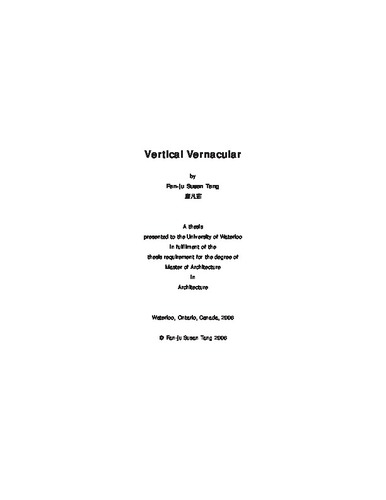| dc.description.abstract | The rapid modernization and densification of Taipei has resulted in a culturally and socially unsustainable society. The North American paradigm of high-rise condominiums disrupts the social pattern of the vernacular family, cultural activities and communities, isolating the city dwellers within their own homes. The physical city no longer reflects or supports its social and cultural condition, thus has led to the disintegration of traditional customs and lifestyle without a sustainable replacement. The hypothesis of this thesis is that high-density residential architecture can be reinvented through the reinterpretation of vernacular dwelling to accommodate cultural sustainable activities and a sociable, identifiable community. <br /><br /> The first three chapters record and examine three branches of research: vernacular Taiwanese culture and architecture, high-density vernacular architecture, and the current condition of Taipei, Taiwan. The research deals with various disciplines, most importantly family and social structure, to provide a foundation for further discussion of dwelling condition versus culture. Chapter iv compares and analyzes the relationship between residential architecture and lifestyle of the vernacular and current dwelling. It argues for the importance of communities at different scales, bound together by a hierarchy of communal spaces. The condominium building is carefully reexamined under the categories of the unit, the floor, the building as a village, and the neighbourhood. <br /><br /> The design project, Vertical Vernacular [chapter v], presents a new typology of high-density residential architecture. It demonstrates the implantation of the theories and prototypes developed in the previous chapter, by consideration of current culture and family structure, including both traditional customs and modern lifestyle. A full range of unit plans are developed based on demographics, family structure, traditional custom, and adoption of tradition to modern imperatives. The co-operative living environment inspired by the vernacular dwelling creates friendly, strong and safe communities within the condominium. Furthermore, the project aims for the feasibility of the concept within the densest district of Taipei City from a developer's point-of-view. | en |

